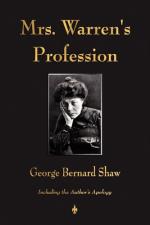The acting, too, required courage and character as well as skill and intelligence. The veto of the Censor introduced quite a novel element of moral responsibility into the undertaking. And the characters were very unusual on the English stage. The younger heroine is, like her mother, an Englishwoman to the backbone, and not, like the heroines of our fashionable drama, a prima donna of Italian origin. Consequently she was sure to be denounced as unnatural and undramatic by the critics. The most vicious man in the play is not in the least a stage villain; indeed, he regards his own moral character with the sincere complacency of a hero of melodrama. The amiable devotee of romance and beauty is shewn at an age which brings out the futilization which these worships are apt to produce if they are made the staple of life instead of the sauce. The attitude of the clever young people to their elders is faithfully represented as one of pitiless ridicule and unsympathetic criticism, and forms a spectacle incredible to those who, when young, were not cleverer than their nearest elders, and painful to those sentimental parents who shrink from the cruelty of youth, which pardons nothing because it knows nothing. In short, the characters and their relations are of a kind that the routineer critic has not yet learned to place; so that their misunderstanding was a foregone conclusion. Nevertheless, there was no hesitation behind the curtain. When it went up at last, a stage much too small for the company was revealed to an auditorium much too small for the audience. But the players, though it was impossible for them to forget their own discomfort, at once made the spectators forget theirs. It certainly was a model audience, responsive from the first line to the last; and it got no less than it deserved in return.
I grieve to add that the second performance, given for the edification of the London Press and of those members of the Stage Society who cannot attend the Sunday performances, was a less inspiriting one than the first. A solid phalanx of theatre-weary journalists in an afternoon humor, most of them committed to irreconcilable disparagement of problem plays, and all of them bound by etiquette to be as undemonstrative as possible, is not exactly the sort of audience that rises at the performers and cures them of the inevitable reaction after an excitingly successful first night. The artist nature is a sensitive and therefore a vindictive one; and masterful players have a way with recalcitrant audiences of rubbing a play into them instead of delighting them with it. I should describe the second performance of Mrs Warren’s Profession, especially as to its earlier stages, as decidedly a rubbed-in one. The rubbing was no doubt salutary; but it must have hurt some of the thinner skins. The charm of the lighter passages fled; and the strong scenes, though they again carried everything before them, yet discharged that duty in a grim fashion, doing execution




